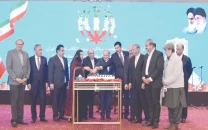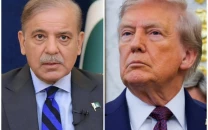Disappointing though not surprising
US' opposition to the Iran-Pakistan gas pipeline project is deeply disappointing, though not surprising.

As far back as the early nineties, Pakistan had signed memorandums of understanding to bring gas from Iran via the IPI (Iran-Pakistan-India pipeline), from Turkmenistan via the TAPI (Turkmenistan-Afghanistan-Pakistan-India pipeline) and from Qatar via the Qatar-Pakistan-India project — but sadly, none is anywhere near fruition. Nothing could be a more powerful indictment of Pakistan’s rulers than the fact that notwithstanding the passage of all these years, the idea of a gas pipeline project has remained a dream, primarily because of their lackadaisical approach, preferring short-time expensive options, rather than serious, long-term solutions.
In the meanwhile, Pakistan’s requirements have increased manifold, as is evident from the unprecedented current energy crisis, which has crippled the industry, adversely affected the country’s GDP, thrown hundreds of thousands out of their jobs and left major cities without power for extended periods of time. The current government’s efforts have focused more on rhetorical flourishes rather than on imaginative initiatives, but nothing can compare with the criminal negligence of the Musharraf regime, which showed little interest in this subject, oblivious to the rapidly growing demand for power.
While all three projects have their advocates, most energy experts in Pakistan and those that I have met in Moscow, Beijing and other capitals, are convinced that the Iran-Pakistan project is technically the most feasible and economically viable option, more so if it were to be extended to India. Nevertheless, it has become a hostage to America’s global ‘Iran containment’ policy and our own pusillanimous attitude to it. Admittedly, the US has a domestic law that prohibits foreign investment of more than 20 million dollars into Iran, on the rather spurious reasoning that it would promote its alleged terrorist and/or nuclear weapons programmes. Though this law has no international sanction, various US administrations have continued to use diplomatic leverage to deter Pakistan from pursuing the project, while warning potential energy companies and investment houses to stay away from it.
But what is particularly galling is that while the US regularly reiterates its opposition to the project, it has done little to offer serious alternatives. It would be relevant to recall that when the US-India civilian nuclear deal was first disclosed in June 2005, analysts and experts here had urged the government to convey Pakistan’s concerns at this arrangement, while also using it to extract American assurance of tacit approval for the IPI project. Sadly, the government dismissed these suggestions on the plea that what happened between America and India was of a little concern to Pakistan! The Bush administration also persuaded India to opt out of the project, while seeking to assuage our concern by hyping the TAPI project and getting the Asian Development Bank to host seminars and conferences on it. While there is no doubt that Turkmenistan’s offer has its merits, its immediate execution remains dependent on the security situation in Afghanistan.
With the energy situation in Pakistan deteriorating alarmingly, the Obama administration made it a major area of interest and the late US ambassador Richard Holbrooke (as well as Secretary of State Hillary Clinton) repeatedly assured us that US assistance in this sector would be both immediate and effective. But so far not much has emerged, other than money for upgrading and repairs of existing dams and thermal projects. Instead, it now appears that the current government’s favourable response to Iran’s urgings to clear the underbrush of issues relating to the IPI, has unnerved the Obama administration enough to make it caution Pakistan again of the pitfalls of going with it. This is deeply regrettable. Instead, the US would do well to seize a great opportunity of demonstrating its commitment to Pakistan’s economic well-being, while also encouraging India to join in as well, as the pipeline could help strengthen meaningful economic cooperation in the region. In any case, we have no alternative but to remain committed to the project.
Published in The Express Tribune, September 21st, 2011.



















COMMENTS
Comments are moderated and generally will be posted if they are on-topic and not abusive.
For more information, please see our Comments FAQ